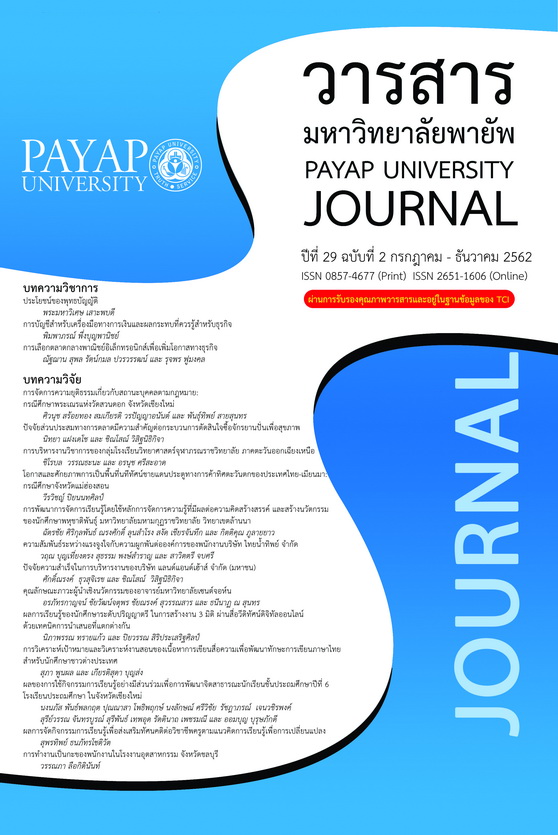การเลือกตลาดกลางพาณิชย์อิเล็กทรอนิกส์เพื่อเพิ่มโอกาสทางธุรกิจ
Main Article Content
บทคัดย่อ
บทความวิชาการฉบับนี้นำเสนอเนื้อหาเกี่ยวกับแนวทางการพิจารณาเลือกตลาดกลางพาณิชย์อิเล็กทรอนิกส์เพื่อเพิ่มโอกาสทางธุรกิจ ด้วยเศรษฐกิจไทยกำลังเปลี่ยนแปลงเข้าสู่เศรษฐกิจยุคดิจิทัล ประกอบกับพฤติกรรมผู้บริโภคที่เชื่อมั่นในการสั่งซื้อสินค้าทางออนไลน์มากขึ้น ส่งผลให้พาณิชย์อิเล็กทรอนิกส์กลายเป็นช่องทางการค้าที่มีความสำคัญ เกิดตลาดกลางพาณิชย์อิเล็กทรอนิกส์ที่เป็นสื่อกลางในการแลกเปลี่ยนสินค้าและบริการ การเลือกตลาดกลางพาณิชย์อิเล็กทรอนิกส์เพื่อเพิ่มโอกาสทางธุรกิจได้สำเร็จนั้น จำเป็นต้องพิจารณาคุณสมบัติที่สำคัญ ได้แก่ ระบบการรับ/จ่ายเงิน ระบบแสดงความคิดเห็น ระบบการรับจ่ายสินค้าและบริการ ระบบค้นหาสินค้า มาตรการคัดเลือกผู้ซื้อผู้ขาย และค่าใช้จ่ายในการบริการ นอกจากนั้นแล้วการออกแบบหน้าเว็บไซต์ที่สวยงาม ปรับแต่งได้ง่าย มีภาษาให้เลือกใช้หลายภาษาจะส่งผลให้ผู้ซื้อเกิดทัศนคติที่ดีและไว้วางใจในตัวผู้ขาย นอกจากนี้เว็บไซต์ควรนำเสนอแนวคิดทฤษฎีตัวแบบด้านการยอมรับเทคโนโลยี (TAM) ที่ว่าความตั้งใจในการซื้อสินค้านั้นเริ่มต้นจากการรับรู้ผ่านประสบการณ์ส่วนบุคคลที่มีต่อการใช้งาน หากเป็นความเชื่อในเชิงบวกจะนำไปสู่ทัศนคติที่ดีต่อการใช้บริการ และเกิดความตั้งใจที่จะใช้บริการจนถึงความตั้งใจที่จะซื้อในที่สุด
Article Details
เอกสารอ้างอิง
กรมสรรพากร. (2562). ความรู้เกี่ยวกับอีคอมเมิร์ซ, สืบค้นเมื่อ 5 ตุลาคม 2562. จาก https://www.rd.go.th /publish/26228.0.html.
ขจีนุช สวัสดินาม. (2560). ปัจจัยที่มีผลต่อความไว้วางใจตลาดกลางพาณิชย์อิเล็กทรอนิกส์ในประเทศไทย. วิทยานิพนธ์ปริญญามหาบัณฑิต สาขาวิชาบริหารธุรกิจ บัณฑิตวิทยาลัย มหาวิทยาลัยศิลปากร.
ชลิดา จันทจิรโกวิท. (2558). พาณิชย์อิเล็กทรอนิกส์. เชียงราย : ม.ป.ท.
ภัทราพร เม้ามีศรี, จริยา กองแก้ว และวิชุดา ไชยศิวามงคล. (2560). ปัจจัยที่ส่งผลต่อการซื้อสินค้าบนระบบ E-Commerce, สืบค้นเมื่อ 3 ตุลาคม 2562. จาก http://sc2.kku.ac.th/stat/statweb /images/Eventpic/60/Seminar/01_4_Ecommerce.pdf.
มีนา อ่องบางน้อย. (2553). คุณค่าตราสินค้า ความไว้วางใจและความพึงพอใจต่อความภักดีต่อตราสินค้า CAT CDMA (แคท ซีดีเอ็มเอ). วิทยานิพนธ์ปริญญามหาบัณฑิต สาขาวิชาการตลาด มหาวิทยาลัยศรีนครินทรวิโรฒ.
รัฐญา มหาสมุทร และวรัชญ์ ครุจิต. (2559). กลยุทธ์การสื่อสารของผู้ทรงอิทธิพลทางความคิดในโลกออนไลน์ที่มีผลต่อทัศนคติของกลุ่มผู้ติดตาม. วารสารการสื่อสารและการจัดการ นิด้า 2(1), 81-106.
สถาบันเทคโนโลยีนานาชาติสิรินธร มหาวิทยาลัยธรรมศาสตร์. (2551). โครงการศึกษาระบบตลาดกลางพาณิชย์อิเล็กทรอนิกส์ กรมพัฒนาธุรกิจการค้า กระทรวงพาณิชย์, สืบค้นเมื่อ 1 มิถุนายน 2562. จาก https://www.dbd.go.th/download/data_srevice/Final_Report.pdf.
สราวุฒิ ทองศรีคำ และมฑุปายาส ทองมาก. (2559). อิทธิพลของการสื่อสารแบบปากต่อปากทางอิเล็กทรอนิกส์ต่อความตั้งใจชมภาพยนต์ไทย. วารสารมหาวิทยาลัยพายัพ, 26(1), 129-149.
สรีพร โพธิ์งาม. (2559). อิทธิพลของภาพลักษณ์ตรา ความเชื่อถือและความพึงพอใจ ต่อความภักดีต่อ ลาซาด้าของลูกค้าในกรุงเทพมหานคร. วารสารวิชาการ คณะบริหารธุรกิจ มหาวิทยาลัย เทคโนโลยีราชมงคลพระนคร, 1(1), 386-396.
สาขาวิชาเศรษฐศาสตร์ มหาวิทยาลัยสุโขทัยธรรมาธิราช. (2561). เศรษฐกิจดิจิทัล : ความท้าทายของเศรษฐกิจไทยในอนาคต. กรุงเทพฯ : โรงพิมพ์แห่งจุฬาลงกรณ์มหาวิทยาลัย.
สำนักงานพัฒนาธุรกรรมทางอิเล็กทรอนิกส์ (องค์การมหาชน). (2562). รายงานผลการสำรวจมูลค่าพาณิชย์อิเล็กทรอนิกส์ในประเทศไทย ปี 2560, สืบค้นเมื่อ 7 ตุลาคม 2562. จาก https://www.etda.or.th
/publishing-detail/value-of-e-commerce-survey-2017.html.
สำนักวิชาการ สำนักงานเลขาธิการสภาผู้แทนราษฎร. (2558). เศรษฐกิจดิจิทัล (Digital Economy): นโยบายขับเคลื่อนเศรษฐกิจใหม่, สืบค้นเมื่อ 3 ตุลาคม 2562. จาก https://library2.parliament.go.th
/ejournal/content_af/2558/mar2558-2.pdf.
อาริยา ลีลารัศมี. (2558). องค์ประกอบของเว็บไซต์พาณิชย์อิเล็กทรอนิกส์และความไว้ใจในการซื้อสินค้าที่มีผลต่อการตัดสินใจซื้อสินค้าแบรนด์เนมผ่านเว็บไซต์พาณิชย์อิเล็กทรอนิกส์ของผู้บริโภคในเขตกรุงเทพมหานคร. รายงานการศึกษาอิสระ ปริญญาบริหารธุรกิจมหาบัณฑิต มหาวิทยาลัยกรุงเทพ.
โอภาส เอี่ยมสิริวงศ์. (2556). พาณิชย์อิเล็กทรอนิกส์ (มุมมองด้านการบริหาร). กรุงเทพฯ : ซีเอ็ดยูเคชั่น.
Davis, Fred D., Bagozzi, Richard P., and Warshaw, Paul R. (1989). User Acceptance of Computer Technology: A Comparison of Two Theoretical Models. Management Science, 35(8), 982-1003.
Lnwshop. (2562). รู้จัก Lnwshop, สืบค้นเมื่อ 5 ตุลาคม 2562. จาก https://www.lnwshop.com /features/whylnwshop.
Sogoodweb. (2562). E-Marketplace คืออะไร, สืบค้นเมื่อ 7 ตุลาคม 2562. จาก https://blog.sogoodweb.com /Article/Detail/9344/E-Marketplace.


